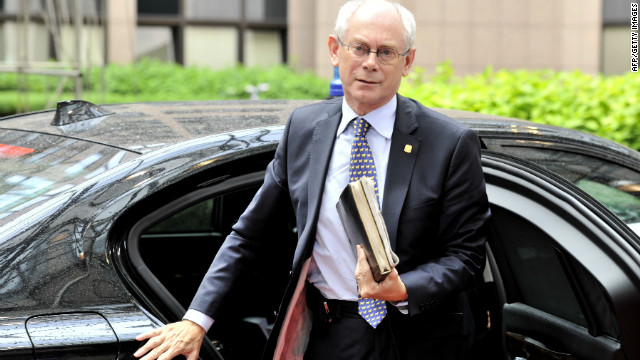
(Financial Times) -- EU leaders agreed a seven-year budget after a bargaining session in Brussels lasting more than 24 hours.
Herman Van Rompuy,
European Council president and chair of the negotiations, tweeted: "Deal
done! #euco has agreed on #MFF for the rest of the decade".
On Friday morning it was
expected that the budget, covering 2014-2020 would be €960bn. If correct
the budget would be about 3 per cent less than the current long-term
budget and represent the first ever decline in EU spending.
It would be a sharp cut
from the €1,033bn first proposed by the European Commission, the EU's
executive arm, at the outset of negotiations.
The compromise emerged
after a bruising battle that saw Britain's David Cameron leading demands
for deep cuts to reflect the austerity undertaken by many governments
and François Hollande, French president, rallying the defence of EU
spending to help recession-hit economies.
Angela Merkel, the German
chancellor, helped broker the likely deal with Mr Van Rompuy. It
includes €1bn cuts in spending on the Brussels bureaucracy, big
reductions in cross-border infrastructure projects supposed to boost
growth, and a special €6bn fund set up to tackle youth unemployment.
But in an ominous warning
of trouble ahead, Martin Schulz, president of the European parliament,
said his institution might yet reject it.
"The further we step away
from the commission's proposed figures, the more likely the proposal
will be rejected," he said, adding that MEPs were "extremely sceptical".
The summit comes less
than three months after a previous effort to agree the budget collapsed.
Several diplomats have warned that another failure would be far more
costly because it could be at least a year before they could resolve the
matter -- a delay that would disrupt billions of euros in EU spending.
In a display of the
tension and ill-temper that characterise one of the EU's most notorious
exercises, Mr Hollande refused to attend a Thursday afternoon meeting
with Mr Cameron and Ms Merkel, as he dug in against the British
position.
Mr Van Rompuy delayed
presenting a compromise until the early hours of Friday morning, forcing
the EU leaders into more than 15 hours of negotiations before he
presented his plan to shave a further €12bn from his November proposal.
In addition to the €960bn figure, the package also included about €36bn
in off-budget items.
Most of the new cuts
come from a fund to build cross-border infrastructure that the
commission has touted for its potential to generate economic growth. The
budget for agriculture -- a key French priority -- is being spared
further cuts, although the seven-year total is more than 10 per cent
down on current spending.
The compromise sets the
figure for budget "commitments" -- the maximum amount of money allotted
during the seven-year period -- at €960bn, while budget "payments" --
the amount of money that can actually be spent -- are more sharply
reduced by €34bn to €908bn.
The latter figure is the
key target for the UK government in its campaign for outright cuts.
Although commitments have long been the standard measure for EU budgets,
Mr Cameron has focused relentlessly on payments in an effort to present
the smallest possible figure to voters back home, who are increasingly
sceptical of the EU.
The final result was
more than the €886bn demanded by British officials in the early stages
of the talks. But the reductions should be more than sufficient for Mr
Cameron to sell the deal to the UK parliament.
Mr Schulz was
particularly critical of the accounting finesse -- widening the gap
between payments and commitments -- Mr Van Rompuy used to accommodate
the French and British positions.
Doing so would result in
future deficits for an EU that was already grappling with a mounting
pile of unpaid bills, he said. "More and more tasks, and less and less
money -- the inevitable result is budget deficits," Mr Schulz tweeted.
"The [European parliament] will not go along with this."
No comments:
Post a Comment